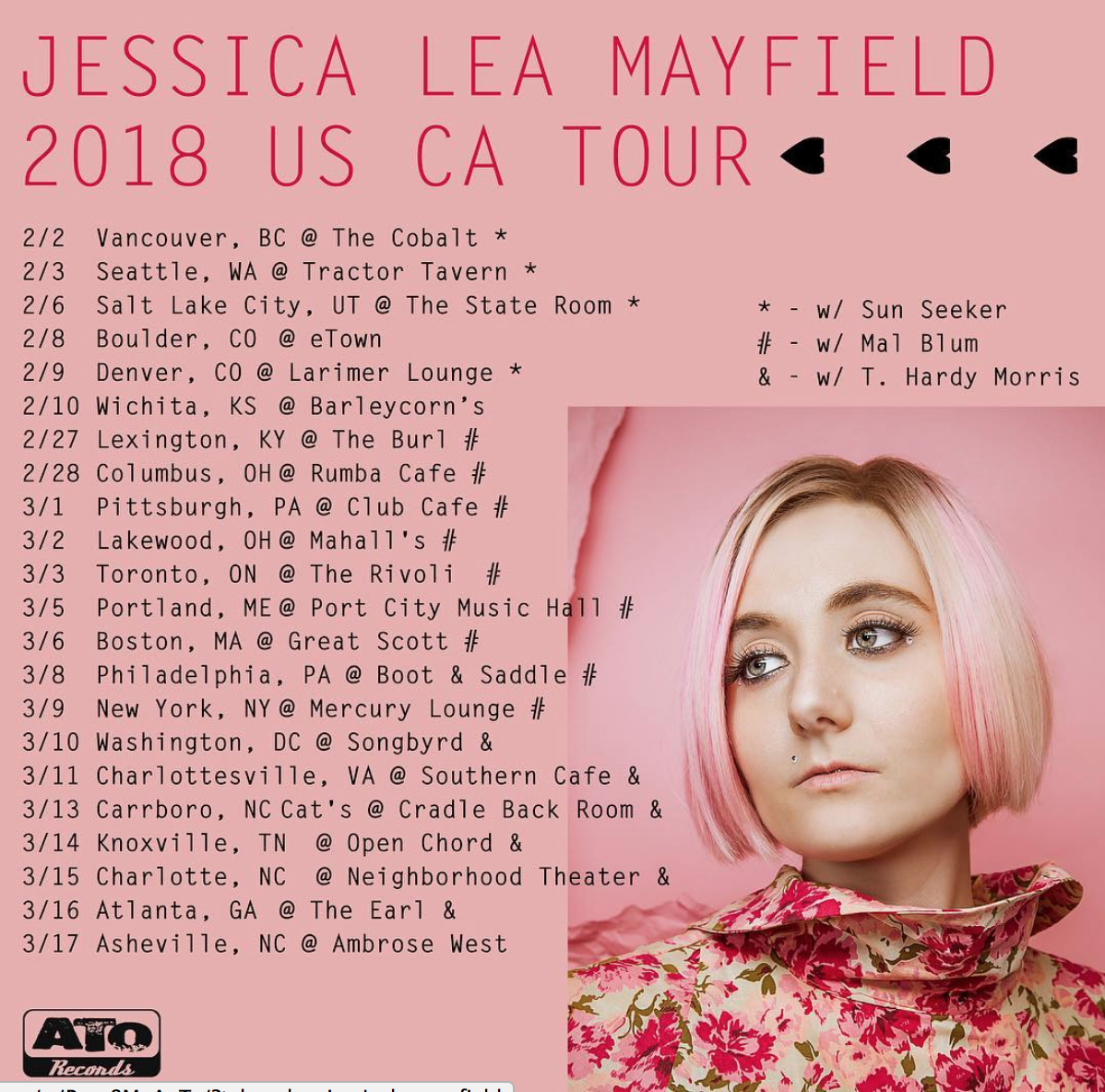
If you’ve gone through even half the hell that country/grunge rock genius Jessica Lea Mayfield has, you know how hard it is to heal. Among overdue surgeries, a subsequent car accident, and a cancelled tour back in October, the singer/songwriter/baritone guitar-lover is doing her hard work, publicly. Starting last July, before the release of her most recent LP, Mayfield posted a photo of herself in a hospital gown along with this statement:
“I’ve struggled with posting this but feel it’s necessary. Last week, I had a surgery for a broken shoulder related to a domestic violence incident. I had been suffering with this injury (and others that still require surgeries) for 3 years. This is not uncommon. I want to tell anyone who is protecting their abuser that it’s not worth it. No one who hurts you loves you. No one should EVER hurt you. Don’t believe them when they say they are sorry. It will happen again. Leave after the first time. It only gets worse. My silence helps no one except the person who did this to me.”
In September, Sorry Is Gone dropped, and so did the curtain around her experience with domestic abuse. But of course, Mayfield’s honesty on the new album is so uniquely Mayfield. With a recognizable twang, she sings about shotguns hidden under futons, being begged to ‘stay,’ and other tell-tale symptoms of her trauma so modestly, it’s gut-wrenching. Doom-y guitars swirl on “WTF” and “Soaked Through,” creating an atmosphere that swallows any listener whole. But then, “Safe 2 Connect 2” is a disenchanted folk tune. On the album’s title track, she writes one of the most empowering lines of the year, given the context: “I deserve to occupy this space without feeling like I don’t belong / I’m done excusing myself / I’m sorry, I’m sorry, but sorry is gone.”
At once, Mayfield’s new album reclaims her life, revitalizes her music, and serves as the artist’s most important work to date. Easily blending country with grunge, and empowerment with trauma, Mayfield has turned her hardest struggle into something relatable and beautiful. In an effort to make more space for her story and these songs, I called up Mayfield ahead of her Boston show at the Great Scott. Here’s what she had to say.
Allston Pudding: How are you doing?
Jessica Lea Mayfield: Doing good, I played in Columbus last night. That sold out, I believe tonight is sold out. So the shows are going well. That’s good.
AP: Is that the kind of reception you’ve been getting since you started tour and the album release?
JLM: Yeah. I’ve definitely been surprised at how well people have connected to this record. For it being so personal, I feel like a lot of people can relate.
AP: How does it feel to play these songs live?
JLM: It’s the same thing. It’s interesting to get on stage. And especially the first couple shows of each part of the tour. I take a couple weeks off, and I return and see people singing along and I’m just surprised. I’m just like, ‘Wow, yay, I’m so glad that you like it, and can relate to it.’ And that it’s doing something for someone.
AP: How long were you working on the songs that made it onto the new album?
JLM: Some of them probably go back to a year, year and half before I recorded the album. Some of them I started but didn’t really finish until later. I had the general idea down, and didn’t finish ‘em until I was in the studio. I kind of tried to leave things a little open-ended with this album because I wanted to leave room for John Agnello to have ideas. So I kind of brought him some things that weren’t quite finished yet so I could get his direction.
AP: I think your sound on Sorry Is Gone is heavier or doomier than your previous albums, and I read that you are inspired a lot by music you grew up with. Are there any current artists you draw inspiration from?
JLM: It’s interesting, because as far as music that I make goes it’s like, it comes from a place of nostalgia. My last album was really heavy too and it was definitely inspired by, like, Stone Temple Pilots and Soundgarden and heavier, grunge period stuff— The things that I grew up hearing as a kid that made me the person that I am. I think that for me, it’s interesting to see where the influences come out.
Music is super nostalgic for me. Even seasonally. It’s like, every year when certain seasons start to hit, there’s music I want to listen to. And then I try to date it back and sometimes it’s like, ok I remember that one year when I was 15 and listened to this album in the fall and now want to hear it every time the leaves change.
AP: Anything specific?
JLM: Oh, Elliott Smith. There’s certain Elliott Smith albums that I listen to seasonally. By the time spring rolls around, I’m back on the self-titled album again. And by the time fall rolls around, I get into Roman Candle again. It’s just one of those things where, without fail during those seasons, if I put those albums on, it’s gonna work.
AP: That speaks to how powerful and enduring that music is, which is really cool to continue to experience!
AP: The content and the lyrics of your songs, you’ve been really open and honest about, I might say more than any other album. I’ve read that it was a huge and intentional decision to open up in that way. I’m wondering if there were any musicians or public figures that could you look up to or take notes from who have gone through a similar opening up?
JLM: I don’t really think of it that way, but that’s interesting. I guess because I, myself, don’t get swayed by opinions of other musicians or public figures. I just think well, we’re all people and then I wonder why would anyone ever listen to anything I say. But I’m thankful for the chance to speak and have a platform. So I kind of view it that way.
But for me, I’m getting older and able to express myself more clearly and also realize that the healthiest thing for myself is to not give a shit about protecting the wrong people and just putting yourself first. And I think that’s something a lot of people especially women do is covering for people who don’t have their best interests in mind. And it’s exhausting and you don’t even know you’re doing it. And then you’re like, ‘Oh wait my life is being drained out of me, oops.’
AP: That makes a lot of sense and I feel that pretty hard! What does that kind of self-care look like for you at this point?
JLM: Just taking the time to do the right things for yourself. Anything that is relaxing and something where you can breathe and eat. Eat properly, but eat first. Just put fuel in your body. Treat yourself like you would treat someone you love. I think that’s the thing that a lot of people don’t do. You can burn yourself out on other people and then realize that you never put that amount of effort into your own self.
So, it’s always hard. I’m the kind of person who will give and give until I don’t have anything left. My therapist said with doing this interviews, ‘Everytime you do this, you’re giving a piece of yourself away that you can’t get back.’ And I’m like, I know but I want to talk about this because it’s important to me. But I understand that this is not always the best thing. There’s a bigger picture you have to look at. It’s protecting yourself and knowing what you can do. And doing whatever it is that’s going to make you happy.
AP: Yeah, setting boundaries and having a balance are a huge things for me, personally.
JLM: I think people just want to come in and wreck all your boundaries and take over!
AP: Knowingly or not.
JLM: I think that’s the thing, too. It’s usually unknowingly, and that’s the problem. It’s one of those things where it’s like, well, you’re knowingly ignorant though. There’s only so long you can unknowingly be a certain way and ignore it. Even with men I’ve seen this in my life, where it’s like, ‘I know you don’t know that you’re doing something wrong but… Just because you don’t know that you’re doing something wrong doesn’t mean you’re not doing something wrong. And that you shouldn’t try to see at least what I’m talking about.’
AP: That’s cool. You’re so self-reflective. Sometimes that’s necessary, I think, for some people who have been through trauma.
JLM: I think if anything the reflectiveness is just a defensive mechanism of some sort, too. I’m always wondering, ‘Why didn’t I see that? How did that happen again?’ Beating yourself up over things that have happened to you, that aren’t your fault. Wishing that there was some way that you could change it, but you can’t. You don’t know what other people are going to do, and I think that’s another to fault yourself for trusting someone. You can’t do that because it’s understandable to want to trust people.
AP: That’s a really admirable quality actually, and I think a huge sign of strength is being able to trust people. Alright, I’m going to switch gears and ask you about your gear. What do you record with and what do you take on tour?
JLM: I I have some really old guitar pedals. I have an SIB Varidrive, a tube distortion pedal, and a BOSS chorus ensemble. I bring a Fender Jaguar and my Gretsch baritone. Usually if I have more room, I bring my acoustic Taylor baritone, depending on the tour. I didn’t bring it this time but I used that guitar a lot on the record. The whole thing is just a lot of lower-end guitar stuff.
AP: I love it. Do you have any musical or otherwise creative endeavors for after tour?
JLM: Not currently. Right now I’m just still working on touring this record. Then after that I’ll probably take a little break and write a song. But who knows? I try not to make too many plans. I just sort of do what I’m wanting to do. ‘Cause if I plan to do something, it’ll probably make me not want to do it!
AP: That sounds like a good plan. Hope your shows go well, and I’ll see you in Boston!
Jessica Lea Mayfield performs at Great Scott with Mal Blum and The Blums today, Tuesday March 6th / 18+ / Tickets- $15 / Facebook Event

